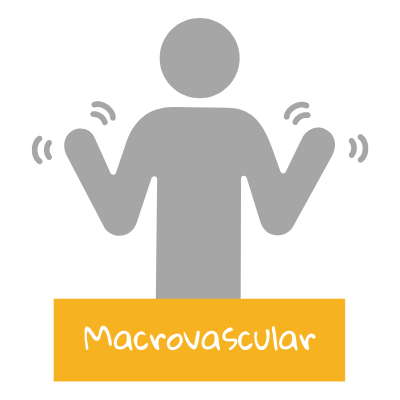support for teens
Complications
Home / Complications
Why are there complications?
Complications of diabetes may develop at any time
within 10 or 15 years of diagnosis. However, they are
preventable. Excessive blood sugar levels over an
extended period can damage certain cells — particularly
those of the eyes, kidneys, nervous system and circulatory system’s large vessels.
How can they be prevented?
Good monitoring has produced a substantial decline
in complications. Monitoring your blood sugar can
eliminate or greatly reduce the risk of complications.
That’s all there is to it!
What is effective monitoring? HbA1c under 7% is ideal
for a big reduction in complications. Any decline in
HbA1c levels, whatever the starting level, is good and
you can take pride in it
Did you know?
- Most of these complications develop very
slowly and can go unnoticed until you suffer
serious consequences. - Different tests can be used to detect and
then reverse such complications, so make
sure to see you doctor regularly. - Smoking seriously increases the risk of
cardiovascular disease in diabetics and also
increases the chance of kidney or
eye damage. - Complications may appear from the age of
20 or 30 if the diabetes is poorly controlled. - Any reduction in HbA1c levels is a big victory
in minimizing complications.

Complications can occur because the sugar that accumulates in the bloodstream over a long period of time is harmful to certain cells.
You may have been diabetic for a long time and you may not remember exactly why we work so hard together to make sure you have the best control. Basically, we want you to stay healthy for many years to come without any further health problems, because diabetes can have some long-term consequences.
Gour main long-term complications:

1 - Retinopathy : complications involving the capillaries of the retina...
at the back of your eye, are often due to high blood sugar, which can damage vision over the long haul. Weakened capillaries can leak blood inside the eye. More serious cases can result in blindness in one or both eyes
You won’t notice gradual damage caused by chronic high blood sugar—until it’s too late. That’s why you should see a specialist once a year before the damage starts. Some damage can be reversed with laser therapy, for example.
2 - Nephropathy: kidney complications
The kidneys, which filters waste from our bloodstream,
are also very sensitive to chronic high blood sugar in the vessels that irrigate them.
High blood sugar has a gradual impact that will ultimately result in kidney failure, requiring multiple weekly dialysis sessions (artificial kidney treatments). A kidney transplant may eventually be necessary.
Once again, the damage leading to renal failure is also silent but deadly. However, an annual microalbuminuria test will alert us to the disease in its early stages, so we can nip it in the bud.


3 - Neuropathy and the nervous system
When the nervous system of certain organs is affected by chronic hyperglycemia, this can cause several symptoms.
Chronic high blood sugar can impair the nervous system:
- Skin : Tingling, chronic numbness, burning sensation in
hands or feet. - Male genetals : Erectile disorder and impotence.
- Urinary system : difficulty urinating.
- Digestive system : Indigestion, nocturnal diarrhea, vomiting.
4 - Macrovascular complications of the cardiovascular system
Plaque can block our arteries from early adulthood, increasing the risk of a heart attack or stroke.
Chronic high blood sugar is a key reason for these complications, which can be aggravated by smoking and a poor diet.

Source
Diabetes Section Team
Ste-Justine UHC
University of Montreal



